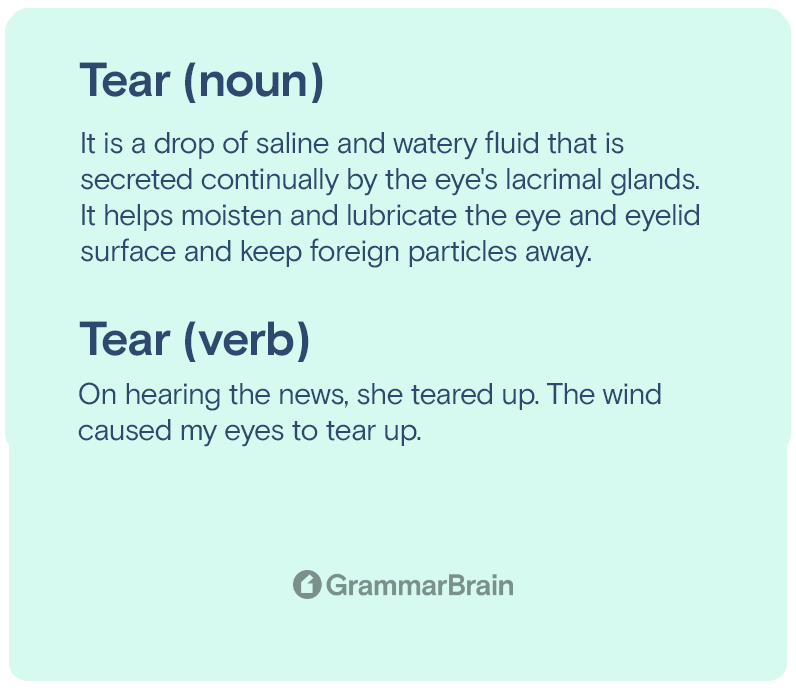The word tear is used in quite an interesting way. Though tear and tear are identically spelled, there is a difference in the manner of pronunciation, their meanings, and their usage in sentences. Such a word is also known as a heteronym. Let’s look into the meanings of these words, their definitions, and their source, along with some examples of how they are used in sentences.
Tear (Teer):
Definition:
Tears refer to the salty liquid that the eyes produce. At times, this word is used to depict crying or sorrow. Sometimes, this word is used like an intransitive verb (i.e. a verb which doesn’t take the object). Related words include tears, tearing, and teared.
Meaning or “tear”
1. As a noun:
It is a drop of saline and watery fluid that is secreted continually by the eye’s lacrimal glands. It helps moisten and lubricate the eye and eyelid surface and keep foreign particles away.
This watery fluid appears in or flows from the eyes due to emotion, specifically grief.
For e.g.: shedding tears.
It also refers to something that resembles or suggests a tear. For instance, a liquid drop or a tearlike mass of a solid substance with tearlike mass, with one end being spherical in shape and the other end with a tapering point.
For e.g., tears of dew.
2. As a verb:
To overflow or fill up with tears.
For e.g.: On hearing the news, she teared up. The wind caused my eyes to tear up.

Tear (Tare)
Definition:
To tear, as a verb, means to rip things apart, to rupture something, or to rip something into pieces. As a verb, it also indicates rushing about in a very reckless manner. Words related to it are tore, tears, tearing, torn.
Meaning:
1. As a Noun:
1a: Damage caused due to being torn: a hole made due to tearing
1b: the action of tearing anything
2a: Hurried or violent rush
2b: a spree
For e.g.., she got her salary and indulged herself with a tear
2. As a Verb
Tore; torn; tearing
1: to detach parts of; to pull apart or divide by force: Rupture/Rend
Intransitive verb
Understanding “tear” as an intransitive verb.
1: to detach on being hauled
For e.g., This shirt tears easily
2a: to act or move with force, haste or violence
For e.g., The man went tearing down the road.
2b: to penetrate or smash something aggressively
Examples of how ‘tear’ is used differently in sentences
- She had tears of joy in her eyes.
- The song touched me emotionally and filled my eyes with tears.
- She nearly tore the overcoat.
- I tore the paper into bits.
- The material is quite delicate and might tear.
- I had to repair the torn outfit.
- The tear in the curtains helped me have a peek at the van.
- She had a ligament tear.
- Canine teeth are for tearing apart flesh.
- Percy flung the door wide open and tore into the living room.
- In his anger, he tore her photograph.
To sum it up, tear and tear (tare) are two different words. They have the same spelling yet are pronounced differently. When used in sentences, they bring out different meanings and emotions of the sentence. You can either tear down the page or tear it up because somebody tore your page!
Inside this article
Fact checked:
Content is rigorously reviewed by a team of qualified and experienced fact checkers. Fact checkers review articles for factual accuracy, relevance, and timeliness. Learn more.
Core lessons
Glossary
- Abstract Noun
- Accusative Case
- Anecdote
- Antonym
- Active Sentence
- Adverb
- Adjective
- Allegory
- Alliteration
- Adjective Clause
- Adjective Phrase
- Ampersand
- Anastrophe
- Adverbial Clause
- Appositive Phrase
- Clause
- Compound Adjective
- Complex Sentence
- Compound Words
- Compound Predicate
- Common Noun
- Comparative Adjective
- Comparative and Superlative
- Compound Noun
- Compound Subject
- Compound Sentence
- Copular Verb
- Collective Noun
- Colloquialism
- Conciseness
- Consonance
- Conditional
- Concrete Noun
- Conjunction
- Conjugation
- Conditional Sentence
- Comma Splice
- Correlative Conjunction
- Coordinating Conjunction
- Coordinate Adjective
- Cumulative Adjective
- Dative Case
- Determiner
- Declarative Sentence
- Declarative Statement
- Direct Object Pronoun
- Direct Object
- Diction
- Diphthong
- Dangling Modifier
- Demonstrative Pronoun
- Demonstrative Adjective
- Direct Characterization
- Definite Article
- Doublespeak
- False Dilemma Fallacy
- Future Perfect Progressive
- Future Simple
- Future Perfect Continuous
- Future Perfect
- First Conditional
- Irregular Adjective
- Irregular Verb
- Imperative Sentence
- Indefinite Article
- Intransitive Verb
- Introductory Phrase
- Indefinite Pronoun
- Indirect Characterization
- Interrogative Sentence
- Intensive Pronoun
- Inanimate Object
- Indefinite Tense
- Infinitive Phrase
- Interjection
- Intensifier
- Infinitive
- Indicative Mood
- Participle
- Parallelism
- Prepositional Phrase
- Past Simple Tense
- Past Continuous Tense
- Past Perfect Tense
- Past Progressive Tense
- Present Simple Tense
- Present Perfect Tense
- Personal Pronoun
- Personification
- Persuasive Writing
- Parallel Structure
- Phrasal Verb
- Predicate Adjective
- Predicate Nominative
- Phonetic Language
- Plural Noun
- Punctuation
- Punctuation Marks
- Preposition
- Preposition of Place
- Parts of Speech
- Possessive Adjective
- Possessive Determiner
- Possessive Case
- Possessive Noun
- Proper Adjective
- Proper Noun
- Present Participle
- Prefix
- Predicate



